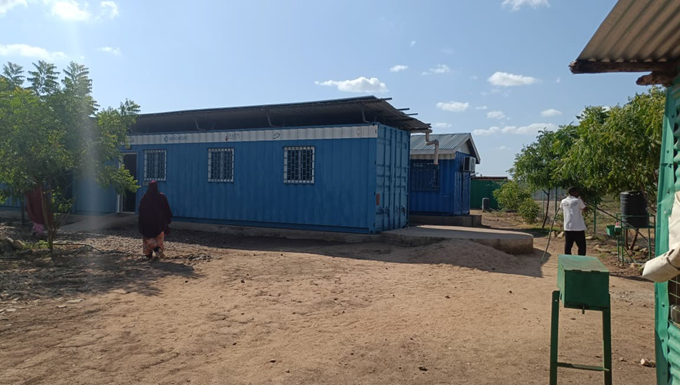SIR – Empowering Young Women Through Digital Skills in Kakuma

In 2017, the Solidarity Initiative for Refugees (SIR) was little more than a vision, an organization born from the desire to provide marginalized young women in Kakuma Refugee Camp with opportunities to escape the limits of their circumstances. Led by refugees for refugees, SIR set out to equip women and girls with the digital skills needed to unlock new possibilities. Since then, it has grown into a pillar of empowerment, helping hundreds of young men and women as they work toward economic independence.
SIR’s growth and impact over the years have been substantial, driven by strong partnerships, relentless innovation, and a deep understanding of the refugee community’s unique needs. From small beginnings to a sustainable future, SIR’s journey powerfully demonstrates the potential of digital skills training in transforming lives, even in the most challenging environments.
The Early Days: From Modest Beginnings to a Critical Hub
In its earliest days, SIR operated from a single small room, accommodating just 25 young women at a time. Resources were limited, the internet was unreliable, and only few in the community recognized the value of digital skills training. But the need was undeniable. For young women in Kakuma, opportunities to gain employment or develop new skills were nearly nonexistent. Many were confined to traditional roles at home, with little prospect of financial independence.
“We didn’t have much, but we had hope,” recalls Andrew Malumalu, SIR’s Finance Officer. “We understood that by teaching these girls digital skills, we could open up a whole new world for them.”
As the organization expanded, so did its aspirations. With support from the Learning and Empowerment for Adolescent Refugees and Hosts Project (LEAP), SIR expanded its operations, building a larger digital hub and offering a more comprehensive curriculum. The LEAP project, led by WUSC, played a pivotal role in this transformation, helping SIR not only scale but also refine its focus on employability and long-term success for the participants
WUSC and SIR: A Partnership That Shaped Growth
WUSC’s involvement went beyond providing funding, it was about building a strategic partnership that enabled SIR to evolve. Together, they refined the curriculum, to ensure the skills being taught matched the needs of the digital economy. SIR’s mentors were trained to guide young women through the maze of online job platforms, from transcription and data annotation to graphic design and digital marketing.
“Initially, our focus was on basic skills, but WUSC helped us shift towards market-driven skills,” Andrew explains. “We wanted to ensure that our graduates could not only complete tasks but thrive in the digital freelancing world.” Moreover, WUSC played a crucial role in solving key operational challenges. Internet connectivity, a major hurdle in Kakuma, was made more reliable when SIR switched from Safaricom to Starlink services, significantly reducing costs. This allowed the hub to focus more on creating job linkages and enhancing mentorship programs, ensuring that participants were not just trained, but actively supported in finding work
SIR Navigating Cultural Resistance: Engaging the Community
SIR’s journey has not been without its challenges. Cultural norms, particularly within conservative communities, often posed significant barriers to participation. Many parents were reluctant to allow their daughters to engage in digital work, viewing it with suspicion or misunderstanding the nature of the opportunities.
But SIR’s community mobilizers, aware of these concerns, took a proactive approach. “We knew we had to engage with the community,” shares one of SIR’s senior mobilizers. “We held dialogues with parents, religious leaders, and community elders to explain what the program was about. It took time, but slowly, people began to see the benefits.”
This outreach, combined with visible success stories of the young women who began contributing financially to their households, helped shift mindsets. Over time, the skepticism waned as more families recognized the tangible impact the digital training could have on their daughters’ futures.
Empowering Young Mothers: The Game-Changer of the Crèche Facility
One of the key innovations that helped SIR stand out was the introduction of a crèche facility for young mothers. Many young women bear the responsibility of childcare, which often serves as a significant barrier to pursuing education and employment opportunities. Recognizing this, SIR created a safe space where participants could leave their children while they attended training.
The crèche has been somewhat of a game-changer,” says Nancy, one of the mentors at SIR. “We were losing too many young mothers because they couldn’t find anyone to watch their children. Now, they can learn and work, knowing their children are in good hands.”
This initiative has sparked a rise in participation from young mothers,
allowing them to develop digital skills and start earning an income, all while continuing to manage their care giving duties. The crèche is a powerful symbol of SIR’s commitment to addressing some of the unique challenges faced by women in Kakuma.
From Training to Income: The Mentorship and Job Linkage Model
SIR’s approach to digital skills training goes beyond teaching technical skills. The organization’s mentorship and job linkage model ensure that participants are equipped to navigate the often-complex world of online freelancing. After completing the three-month training, participants are paired with experienced mentors who guide them through the process of finding and securing work on various online platforms such as Remotask, Timebucks, and Freecash. However, the freelance economy is volatile, and the challenges are significant. Nancy, a senior mentor, describes the ups and downs: “There are times when jobs are plentiful, and other times when there’s barely anything available. Our job is to help the girls stay resilient, to diversify their income streams, and to always be ready to pivot to another platform.” SIR’s mentors work closely with participants, teaching them how to create strong online profiles, apply for jobs, and manage client relationships. The support doesn’t stop at training completion, mentorship continues long after, ensuring that these young women have the tools they need to succeed in a competitive and unpredictable job market
A Vision for Sustainability: The BPO Model
As SIR moves forward, sustainability is at the heart of its strategy. One of the most promising initiatives is the creation of a Business Process Outsourcing (BPO) unit, which is staffed by graduates from the digital hub. The unit provides services such as transcription, data annotation, and graphic design to local and international clients, generating income to help cover the operational costs of the hub. “The BPO model is our path to sustainability,” explains Andrew. “We’re not just training young women to freelance; we’re creating a business that will keep the hub running long after the LEAP project ends.” The BPO unit also offers steady work for graduates, helping them maintain their skills and secure regular income. It’s a win-win solution: SIR becomes self-sustaining, and participants continue to benefit from the opportunities provided by the hub
Scaling Impact: Expanding into the Host Community
As it looks ahead, SIR is dedicated to broadening its impact beyond Kakuma refugee camp. One of the organization’s key goals is to establish digital hubs in the host community, allowing more young women from Kakuma town and its environs to benefit from the program. This expansion is driven by the realization that the need for digital skills training extends far beyond the boundaries of the refugee camp.
“We’ve seen the impact the program has had here in Kakuma,” says the Operations Manager. “Now, we want to take that success and replicate it in other communities. The demand is there, and we’re ready to meet it.”
A Legacy of Empowerment
SIR’s journey from a small room in Kakuma to a thriving digital skills hub is a story of resilience, innovation, and unwavering commitment to empowering young women. The organization’s evolution has been shaped by strong partnerships, community engagement, and a forward-thinking approach to sustainability.
“We’ve come a long way, but this is just the beginning,” Andrew reflects. “We’re not just training young women to use computers—we’re training them to take control of their futures.” With the BPO model, the expansion into new communities, and the ongoing support of mentors and partners, SIR is poised to continue transforming lives for years to come
